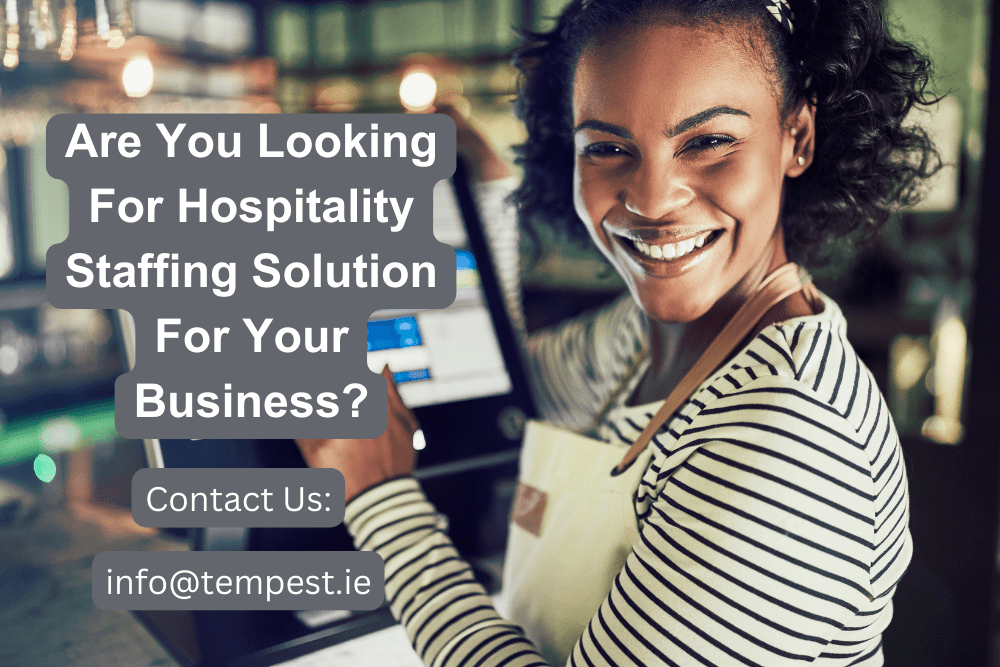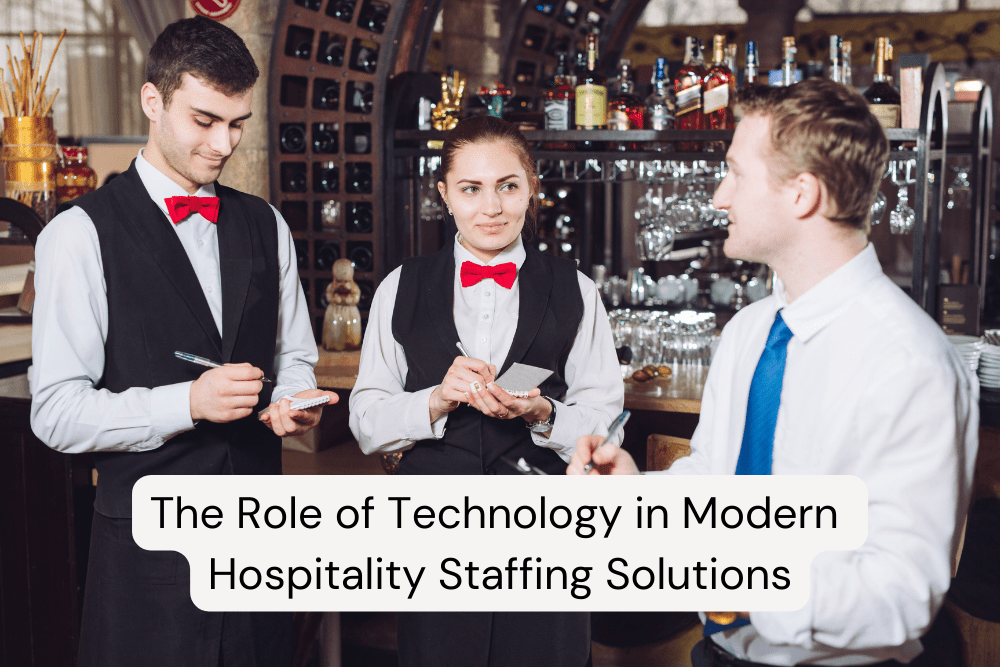The hospitality industry has witnessed a significant transformation in recent years, with evolving consumer preferences and rapid technological advancements reshaping the landscape of hospitality staffing. In this dynamic environment, the role of Technology in Hospitality Staffing emerges as a powerful driving force behind the efficiency and success of hospitality businesses. This section delves into the changing face of hospitality staffing and the pivotal role technology plays in ensuring streamlined operations and exceptional guest experiences.
1 The Changing Landscape of Hospitality Staffing
Gone are the days of traditional recruitment methods dominated by stacks of resumes and time-consuming manual processes. Today, the hospitality sector faces a multitude of challenges, such as fluctuating demand, seasonality, and the need for specialized skills. These challenges call for a more agile and responsive staffing approach. Hospitality businesses now seek innovative solutions to address staff shortages while maintaining high service standards.
2 Importance of Technology in Driving Efficiency and Success
In this digital era, technology emerges as a key enabler for hospitality staffing solutions, revolutionizing how businesses attract, hire, and retain talent. The advent of Applicant Tracking Systems (ATS) has streamlined recruitment processes by automating resume screening, candidate shortlisting, and interview scheduling. By leveraging AI-driven algorithms, businesses can efficiently identify candidates with the right skill set and experience, leading to quicker and more accurate hiring decisions.
Moreover, technology extends beyond recruitment to training and development, where digital onboarding platforms facilitate seamless integration of new hires into the organization. E-learning modules and gamified training programs offer engaging ways to upskill employees, ensuring their continuous growth and improved performance. Additionally, technology plays a vital role in monitoring employee satisfaction through real-time feedback mechanisms, enhancing employee engagement, and ultimately bolstering staff retention.
By embracing technology-driven solutions, hospitality businesses can tap into a vast talent pool, including freelancers and gig workers, to cater to variable demand and seasonal peaks effectively. The use of sophisticated analytics empowers organizations to make data-driven decisions, predicting workforce requirements and fostering diversity and inclusivity in their teams.
3 Streamlining Recruitment Processes
A. Applicant Tracking Systems (ATS)
In the fast-paced world of hospitality, time is of the essence. This is where Applicant Tracking Systems (ATS) come to the rescue. These digital platforms revolutionize the way businesses manage their recruitment process, enabling them to efficiently track and organize candidate applications. With ATS, the arduous task of sifting through stacks of resumes becomes a breeze, as the system automatically parses and categorizes resumes based on predefined criteria.
ATS allows hospitality businesses to create customized screening filters, ensuring that only the most relevant candidates make it to the next stage of the hiring process. By setting specific keywords and qualifications, the system can swiftly identify individuals with the desired skills and experience. As a result, recruiters can focus their time and efforts on evaluating candidates who closely align with the job requirements, expediting the selection process.
B. Automation in Resume Screening and Pre-qualification
The true power of technology lies in automation, and when applied to resume screening and pre-qualification, it yields remarkable results. In the past, manual resume screening was a tedious and time-consuming endeavor, prone to oversight and fatigue. However, with automation, these challenges are overcome, and hospitality businesses can ensure fair and impartial evaluations.
Sophisticated algorithms assess resumes based on predefined criteria, ranging from educational qualifications to relevant work experience. Automation ensures consistency in the screening process, reducing bias and enhancing objectivity. As a result, businesses can swiftly shortlist top candidates, moving one step closer to assembling an exceptional hospitality team.
C. Video Interviews and Virtual Assessments
As the world embraces remote work and virtual communication, video interviews and virtual assessments have become integral to the hospitality staffing process. These tech-driven solutions transcend geographical barriers, enabling recruiters to connect with talent from around the world, widening the talent pool significantly.
Video interviews provide a convenient and cost-effective way to assess candidates’ communication skills, demeanor, and cultural fit. Additionally, virtual assessments, such as skill-based tests and situational simulations, offer insights into candidates’ problem-solving abilities and ability to handle real-world scenarios. These technology-driven evaluations ensure that candidates’ qualifications go beyond what is written on paper, fostering confident hiring decisions.
4 Creating Talent Pools and Candidate Management
A. Building and Nurturing Talent Networks
In the competitive hospitality industry, the importance of building and nurturing talent networks cannot be overstated. These networks serve as treasure troves of potential candidates who have expressed interest in working with the organization in the future. Hospitality businesses can create talent pools by engaging with individuals who may not be an immediate fit for current vacancies but possess valuable skills and qualifications.
To build talent networks, businesses can leverage various channels, such as career fairs, industry events, and online platforms. By fostering meaningful connections and maintaining regular communication, hospitality recruiters can keep these candidates engaged and informed about future opportunities. This proactive approach not only ensures a steady pipeline of talent but also enhances the employer brand, as candidates perceive the organization as forward-thinking and invested in their professional growth.
B. Engaging with Passive Candidates
In the search for top talent, hospitality businesses must not overlook the potential of passive candidates. These individuals may not actively be seeking new job opportunities, but they could be persuaded to consider a change if the right offer comes their way. Engaging with passive candidates requires a strategic and personalized approach.
Technology plays a crucial role in identifying and reaching out to passive candidates. Social media platforms and professional networking sites allow recruiters to establish connections and initiate conversations with these individuals discreetly. By showcasing the organization’s unique selling points and growth opportunities, recruiters can pique the interest of passive candidates and entice them to explore potential roles within the company.
C. Leveraging AI for Candidate Matching
As talent pools expand, the challenge lies in efficiently matching candidates to the most suitable roles. This is where Artificial Intelligence (AI) steps in, revolutionizing candidate management. AI-powered candidate matching algorithms analyze candidate profiles, qualifications, and preferences, comparing them against job requirements and cultural fit.
The use of AI in candidate matching not only saves time but also enhances the accuracy of the selection process. Recruiters can now quickly identify candidates who align perfectly with the organization’s values and skill demands. Additionally, AI-driven candidate matching fosters diversity and inclusivity by mitigating unconscious biases in the recruitment process.
5 Enhancing Onboarding and Training
A. Digital Onboarding Platforms
The onboarding process sets the tone for an employee’s journey with the organization. Hospitality businesses can elevate the onboarding experience with digital onboarding platforms, designed to streamline paperwork, deliver essential training modules, and facilitate quick integration into the team.
Digital onboarding platforms offer a centralized hub for new hires to access crucial information, such as company policies, benefits, and job responsibilities. By automating administrative tasks, businesses can devote more time to ensuring that new employees feel welcomed and supported from day one. Personalized onboarding experiences not only improve employee satisfaction but also contribute to higher retention rates.
B. E-Learning and Online Training Modules
In the fast-paced hospitality industry, continuous learning is a necessity. E-learning and online training modules provide flexible and accessible ways to upskill employees. Through interactive modules and multimedia content, employees can engage in self-paced learning that accommodates their schedules.
Online training allows businesses to address specific skill gaps and ensure that all staff members are equipped with the knowledge and expertise to excel in their roles. From customer service best practices to industry-specific certifications, e-learning platforms cater to a wide array of training needs, fostering a culture of learning and growth within the organization.
Enroll for our Expert Vetted Online Certification Courses below:
C. Gamification for Employee Skill Development
Gamification injects an element of fun and friendly competition into the training process, making learning an enjoyable experience for employees. By incorporating game-like elements such as points, badges, and leaderboards, gamified training encourages staff members to actively participate and strive for mastery.
The interactive nature of gamification promotes engagement and boosts information retention, ensuring that employees retain and apply what they have learned effectively. Moreover, gamified training fosters a sense of camaraderie among employees, as they collaborate and challenge each other to achieve higher levels of skill proficiency.
6 Improving Employee Engagement and Retention
A. Employee Feedback and Pulse Surveys
Employee engagement stands at the core of a thriving hospitality workforce. To gauge employee satisfaction and identify areas for improvement, forward-thinking businesses deploy employee feedback and pulse surveys. These tools offer an avenue for staff members to voice their opinions and concerns, creating a culture of open communication and transparency.
Pulse surveys, conducted at regular intervals, provide real-time insights into employee sentiments, enabling organizations to swiftly address issues before they escalate. The ability to act upon feedback demonstrates to employees that their voices are heard and valued, fostering a sense of ownership and belonging. As a result, job satisfaction and morale soar, leading to increased employee loyalty and reduced turnover rates.
B. Personalized Employee Recognition Programs
Recognizing and appreciating employee contributions is pivotal to sustaining high levels of engagement and retention. Personalized employee recognition programs go beyond generic rewards, tailoring acknowledgments to individual preferences and achievements. These programs acknowledge the unique strengths and efforts of each team member, ensuring that recognition resonates on a personal level.
Technology plays a crucial role in implementing such programs efficiently. Digital platforms facilitate peer-to-peer recognition and instant feedback, creating a culture of appreciation that transcends hierarchies. By celebrating employees’ successes publicly, businesses cultivate a positive work environment that motivates employees to strive for excellence and remain committed to the organization’s success.
C. Predictive Analytics for Employee Retention
In the pursuit of improving employee retention, predictive analytics emerges as a game-changer. By analyzing historical data and identifying patterns, organizations can predict employee turnover risk factors. Armed with this foresight, HR teams can proactively implement retention strategies to mitigate potential departures.
Predictive analytics also helps identify factors that contribute to employee satisfaction, enabling businesses to focus on initiatives that boost engagement and loyalty. From competitive compensation packages to career advancement opportunities, data-driven insights inform strategic decision-making, aligning employee aspirations with organizational goals.
7 The Rise of Gig Economy and Freelancer Integration
A. Leveraging Freelance Platforms for Specific Roles
The gig economy has ushered in a new era of workforce flexibility, and the hospitality industry has embraced this trend with open arms. Freelance platforms offer a vast pool of specialized talent, allowing businesses to engage professionals for short-term projects or specific roles.
From graphic designers to marketing consultants, hospitality businesses can access a wide array of expertise on-demand. This agility allows organizations to respond promptly to market changes and capitalize on emerging opportunities without committing to long-term contracts.
B. Managing Remote Gig Workers Efficiently
With gig workers often operating remotely, effective management becomes paramount. Technology solutions such as project management tools and virtual collaboration platforms facilitate seamless communication and task allocation. Regular check-ins and transparent communication channels bridge the physical gap, ensuring that gig workers feel part of the team and understand their role’s impact on the overall objectives.
By providing clear guidelines and expectations, hospitality businesses can ensure gig workers deliver high-quality outcomes that align with the organization’s brand and values.
C. Balancing Permanent Staff with Freelancers
Achieving the ideal staffing mix between permanent employees and freelancers requires careful consideration. While freelancers offer flexibility, a core team of permanent staff provides stability and continuity. Hospitality businesses must strike a balance to create a cohesive and efficient workforce.
Strategic workforce planning and data analysis can help identify areas where freelancers can complement the existing team. Leveraging freelancers for peak seasons or specialized projects allows permanent staff to focus on core responsibilities, optimizing overall efficiency and guest satisfaction.
8 Data-Driven Decision Making in Staffing
A. HR Analytics and Reporting Tools
In the digital age, data has emerged as a valuable asset in driving informed decision-making, and the realm of human resources is no exception. HR analytics and reporting tools empower hospitality businesses with actionable insights into their workforce. By analyzing data on employee performance, engagement, and retention, HR professionals gain a comprehensive understanding of the organization’s staffing dynamics.
These analytics platforms enable businesses to identify trends and patterns that might otherwise go unnoticed. For example, HR teams can pinpoint areas where employee productivity can be optimized, or detect patterns of attrition that might indicate the need for improved retention strategies. Armed with this knowledge, businesses can make data-driven decisions that align with their strategic objectives and foster a motivated and engaged workforce.
B. Utilizing Data to Forecast Staffing Needs
Anticipating staffing requirements is a critical aspect of efficient workforce management. Data analysis plays a crucial role in forecasting future staffing needs based on historical data and industry trends. By considering factors such as seasonal fluctuations, business growth projections, and anticipated guest demand, hospitality businesses can optimize staffing levels and ensure that they are adequately prepared for varying workloads.
Accurate staffing forecasts prevent understaffing during peak seasons, ensuring that guest experiences remain exceptional, and service standards are upheld. Conversely, avoiding overstaffing during quieter periods improves cost management and resource allocation. Through data-driven staffing projections, businesses strike the right balance between guest satisfaction and operational efficiency.
C. Enhancing Workforce Diversity through Data Insights
Workforce diversity is more than just a buzzword; it is a driving force behind organizational success. Leveraging data insights, hospitality businesses can take proactive steps to enhance diversity and inclusion within their teams. HR analytics tools enable businesses to assess the current state of workforce diversity, identifying areas where representation can be improved.
Data-driven insights provide evidence of the benefits of diversity, promoting inclusive hiring practices and mitigating biases in the recruitment process. Moreover, businesses can analyze data on employee experiences and sentiments to ensure that all team members feel valued and included, fostering a harmonious and productive work environment.
9 Ensuring Data Security and Compliance
A. Best Practices for Data Protection
As hospitality businesses embrace technology for staffing solutions, safeguarding data becomes a paramount concern. Implementing robust data protection measures is essential to prevent unauthorized access, data breaches, and potential legal consequences. Best practices include encrypting sensitive information, restricting data access to authorized personnel, and regularly updating security protocols.
Hospitality businesses must also ensure that employees are educated on data security practices and are vigilant in handling confidential information. By promoting a culture of data security, businesses mitigate the risk of data breaches and instill confidence in both guests and staff.
B. Compliance with Privacy Regulations
In an era of increasing data privacy concerns, compliance with relevant regulations is non-negotiable. Hospitality businesses must adhere to data protection laws, such as the General Data Protection Regulation (GDPR) and the California Consumer Privacy Act (CCPA), to protect the rights and privacy of their employees and applicants.
Compliance involves obtaining informed consent for data processing, providing transparency about data usage, and allowing individuals to access and update their personal information. By upholding privacy regulations, hospitality organizations demonstrate their commitment to ethical data practices and build trust with stakeholders.
C. Safeguarding Employee and Applicant Information
Employee and applicant data are valuable assets and must be treated with utmost care. Hospitality businesses must adopt secure data storage and management systems, ensuring that personal information is stored only for the necessary duration and purpose. When retaining data is no longer required, it should be responsibly disposed of to minimize risks.
Furthermore, safeguarding data extends to external partnerships with staffing agencies or other third-party vendors. Businesses must ensure that these partners adhere to the same stringent data protection standards and compliance regulations.
10 Humanizing Technology-Driven Staffing
A. Creating a Personalized Candidate Experience
While technology plays a pivotal role in modern staffing solutions, it is crucial to remember that behind every resume and application is a human being with unique aspirations and talents. Humanizing the candidate experience is paramount to attracting top talent and building a positive employer brand.
Hospitality businesses can utilize technology to personalize interactions with candidates, ensuring that each individual feels valued and respected throughout the recruitment process. Automated responses can be tailored to address candidates by name, and regular updates on application status can be provided to keep candidates informed and engaged.
Personalization extends to interview processes as well. Video interviews, while efficient, should be designed to put candidates at ease, allowing their personalities and potential to shine through. By leveraging technology thoughtfully, hospitality businesses can create a candidate journey that leaves a lasting positive impression and enhances the organization’s reputation as an employer of choice.
B. Empowering Staffing Teams with Technology
The true power of technology lies not in replacing human expertise but in empowering staffing teams to make better, data-driven decisions. HR professionals can leverage AI-driven tools to analyze vast amounts of data, identify patterns, and make predictions that guide strategic talent acquisition efforts.
By automating repetitive and time-consuming tasks, technology frees up HR teams to focus on building relationships with candidates and fostering a culture of collaboration and support. Empowered by technology, recruiters can dedicate more time to understanding candidates’ motivations, aspirations, and career goals, ensuring the right fit for both the candidate and the organization.
C. Maintaining the Human Element in the Hiring Process
In the age of automation, it is essential to strike a balance between technology and the human touch in the hiring process. While algorithms can efficiently shortlist candidates based on qualifications, the final decision should be made by human judgment, considering cultural fit and emotional intelligence.
Incorporating interactive and personalized elements into the selection process ensures that candidates feel seen and heard. For instance, incorporating informal virtual meet-ups with team members or assigning practical exercises that showcase candidates’ problem-solving abilities adds a personal touch to the hiring journey.
Nurturing relationships with candidates even after the hiring decision is made reinforces the human element. Sending personalized welcome messages and providing comprehensive onboarding support demonstrates genuine care for new employees’ success and integration into the team.
11 Future of Technology in Staffing
A. Advancements in AI for Recruitment Solutions
The future of technology-driven staffing promises even more exciting advancements in AI-powered recruitment solutions. AI algorithms will become increasingly sophisticated, enabling HR professionals to analyze candidates’ soft skills, personalities, and potential cultural alignment. This level of insight will revolutionize talent acquisition, allowing businesses to build diverse and high-performing teams.
Moreover, AI will play an integral role in predicting candidate success in specific roles, leading to better long-term retention and improved workforce planning. By embracing AI-driven recruitment solutions, hospitality businesses will stay at the forefront of innovation in the competitive talent market.
B. Exploring Virtual Reality for Training and Assessments
As virtual reality (VR) technology continues to advance, its integration into training and candidate assessments holds immense promise. VR simulations offer a realistic and immersive environment for employee training, allowing them to practice and refine their skills in a risk-free setting.
For candidate assessments, VR simulations provide valuable insights into candidates’ ability to handle real-world scenarios, enabling employers to make more accurate hiring decisions. Embracing VR in staffing not only enhances the quality of training and assessments but also showcases the organization’s commitment to cutting-edge technology.
C. Preparing for Technological Disruptions in Staffing
As technology evolves, so does the potential for disruptive changes in staffing practices. Hospitality businesses must remain agile and forward-thinking, prepared to adapt to new trends and innovations. Continuous learning and upskilling of HR professionals will be crucial to staying abreast of emerging technologies and their applications in talent management.
Furthermore, fostering a culture of innovation and experimentation within the organization will encourage the exploration of new technologies and their integration into staffing processes. By embracing change and viewing technological disruptions as opportunities rather than threats, hospitality businesses can stay ahead of the curve and achieve sustained success in the future of technology-driven staffing.

Or
If you are looking for more Online Certification Courses, you can check them and Enroll here.
12 Conclusion
In conclusion, technology is not a replacement for the human element in hospitality staffing; instead, it is a catalyst for progress and excellence. By leveraging technology for sustainable staffing, embracing innovation in recruitment and management, and embracing digital transformation, the hospitality industry is poised for a future where the intersection of technology and human connection sets new standards of service and success. As we navigate this dynamic landscape, the possibilities are limitless, and the potential for growth is boundless for those who embrace the power of technology to elevate their hospitality staffing solutions.
Frequently Asked Questions (FAQs)
What is modern technology in the hospitality industry?
Modern technology in the hospitality industry refers to innovative digital solutions and automation tools that optimize various aspects of hotel operations, guest experiences, and workforce management.
What are the common technologies that are being used in the hospitality industry?
Common technologies in the hospitality industry include cloud-based property management systems (PMS), mobile check-in/out, contactless payments, guest-facing mobile apps, and AI-driven chatbots for customer service.
How can technology help hospitality management?
Technology streamlines operations, enhances guest services, and improves staff efficiency in hospitality management. Automation, data analytics, and AI-driven tools aid in better decision-making and resource allocation.
What are the top 10 innovations in the hospitality industry?
The top 10 innovations in the hospitality industry include mobile keyless entry, in-room voice assistants, virtual reality for guest experiences, AI-driven personalization, smart energy management, and blockchain-based loyalty programs, among others.
What are the 6 technology trends redefining the hospitality industry?
The six technology trends redefining the hospitality industry are contactless technology adoption, AI-powered guest experiences, data-driven personalization, IoT integration, sustainability solutions, and enhanced cybersecurity measures.
What are the big five in hospitality?
The “big five” in hospitality refer to the five largest international hotel chains: Marriott International, Hilton Worldwide, InterContinental Hotels Group (IHG), Accor, and Wyndham Hotels & Resorts.
What is smart hotel technology?
Smart hotel technology refers to the integration of IoT devices, automation, and AI-driven systems in hotels to offer enhanced guest experiences, energy efficiency, and streamlined operations. Examples include smart thermostats, connected room controls, and personalized guest preferences.















